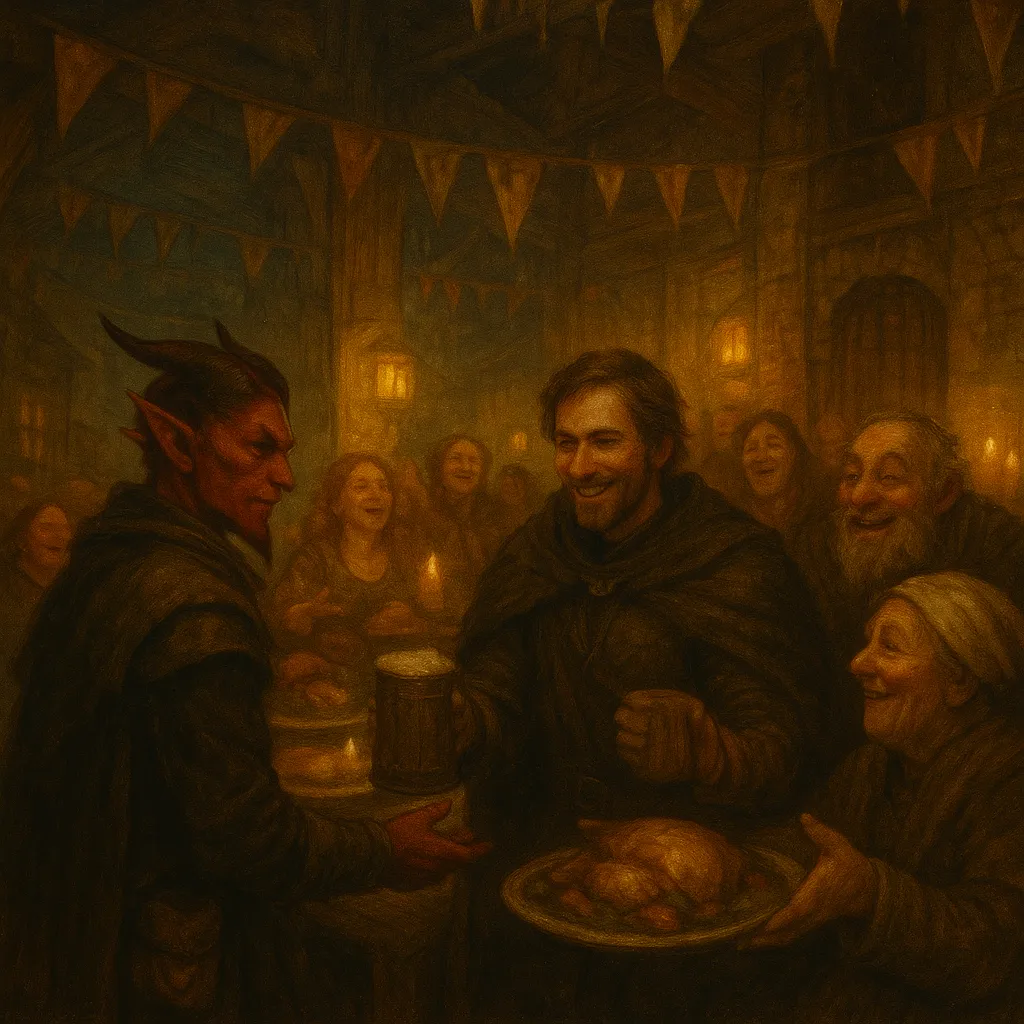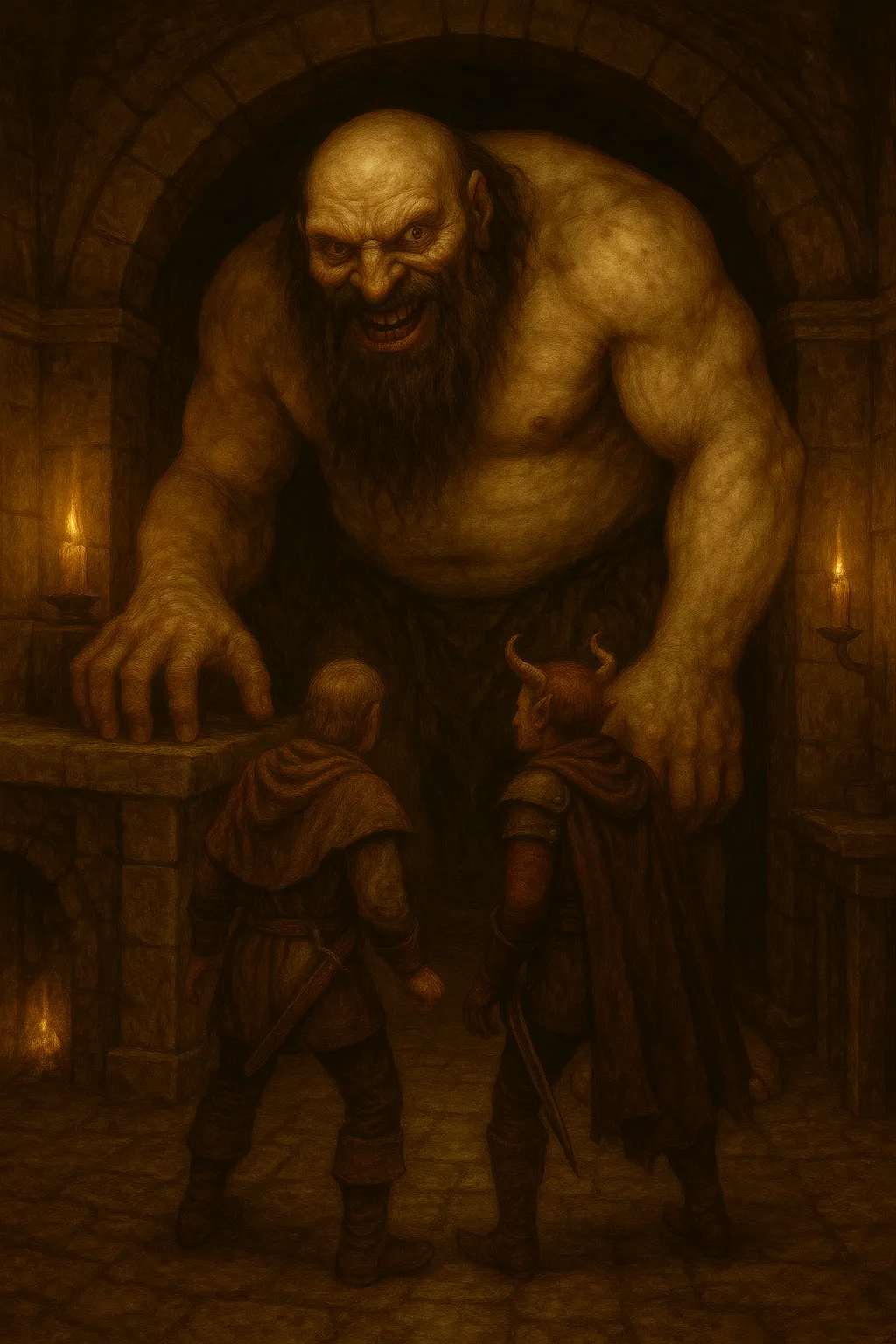The Fallow Feast

A grim tale of false hospitality and ancient hunger — written for storytellers, DMs, and wanderers seeking grounded folk horror and moral unease.
Summary
There are villages in forgotten marshlands where the lanterns burn too warmly and the laughter never fades. Travelers find them by accident, drawn by music and the promise of a meal. The people are kind — overly so — pressing food into every hand, calling strangers guest before names are exchanged.
All are welcome here. All are fed.
And once every season, one of those guests is chosen to stay forever.
Beneath the town hall lies a crypt-cellar where the villagers keep their god — a pale, enormous being called the Granghul, said to have come from the old continent of Loria where demigods once walked among mortals. Here it is worshiped as the Guest Below, a giant who trades safety for a single life each season. The pact has lasted generations.
The feast above is endless. The cellar below, never empty.
The Village
Lanterns glow amber across the reeds. Music spills from open windows. Children chase ribbons through the square while elders raise cups of spiced wine to passing travelers.
Everything here feels slightly too much — the warmth, the kindness, the food. The streets are swept clean, but the corners smell faintly of damp stone. The townsfolk smile with desperate eyes.
Those who linger notice a pattern: every household keeps a single chair empty at their table. When asked, they laugh it off — “A custom,” they say, “for the Guest.”
Details
- The villagers’ joy cracks if outsiders mention hunger or gods.
- The feast never seems to end; there’s always more to serve.
- At night, faint singing echoes beneath the church — slow, reverent, and inhumanly low.
The Feast and the Pact
The celebration lasts for days. Outsiders are treated like royalty — gifted fine clothes, garlands, and endless food. The villagers insist: “Stay until the Feast.”
When the final day arrives, the truth is revealed. The honored guest is led, smiling or screaming, into the church cellar. The crowd sings as they go. No blood is spilled above ground.
The mayor lifts a silver cup, voice shaking but proud:
“One life for all lives. The Guest Below hungers, and we shall feed it gladly.”
Those who resist find no allies among the villagers.
Those who follow willingly are called blessed.
Trap
If anyone attempts to descend early, a crude ward triggers near the cellar door — a burst of soporific vapor brewed from marsh lilies and mushroom extract. Those caught must fight off the drug’s haze or collapse, awakening surrounded by smiling villagers who insist they “drank too deeply” at the feast.
The Cellar Below
The church steps lead into a stone chamber far larger than the building above could contain. Columns are carved into shapes of kneeling figures. Candles gutter in pools of stagnant water. The smell of blood and incense mingles thickly in the air.
At the center reclines the Granghul, the so-called Guest Below — an enormous, pale giant whose eyes burn with dull cunning. It is ancient and bloated, yet disturbingly human in its posture. When it speaks, its voice carries the echoes of others, as though a dozen memories live inside its throat.
“You come to bargain, or to break the bargain?
Both are the same, in the end.”
Details
- Shelves of trinkets, letters, and relics line the walls — all taken from victims, all carefully preserved.
- Its flesh ripples faintly when it breathes, as though other faces press beneath the skin.
- The Granghul feeds on mind as much as meat; its victims’ intelligence becomes part of its own.
- It claims to protect the village from famine and plague — and for generations, it has kept its word.
The Confrontation
The Granghul does not attack immediately. It prefers to reason.
It may offer the adventurers a place in its pact — power, protection, or simply mercy. If denied, it grows indignant, not monstrous. Only when cornered does it rise, ducking beneath the stone arches, and fight with terrible speed.
- Form: A massive, pale giant; twelve to fifteen feet tall; swollen and scarred.
- Temperament: Calm, persuasive, self-righteous.
- Combat: Strikes with crushing blows; may emit a psychic wave that induces visions of voices it has consumed.
- Weakness: Fire and truth — reminders of its mortality.
- Goal: To preserve its rule through reason, manipulation, or force.
If slain, the cellar trembles, and the relics on the walls begin to whisper in a hundred dying voices.
Aftermath
If the Granghul is destroyed:
The village loses its false prosperity within weeks. Crops fail, children sicken, and guilt eats at the survivors. At night, they claim to hear nothing — and that silence terrifies them most.
If spared or bargained with:
The pact renews, perhaps under different terms. The villagers may appear changed, wiser, but the hunger below remains. The Granghul will remember those who treated with it — and may call upon them again.
If fled or ignored:
The feast continues as before. Another season passes. Another outsider vanishes.
DM Notes
- The Granghul are rumored to descend from a demigod’s union with mortal women — hybrids of divine appetite and human cunning. Their kind varies: some rule cults, others wander, but all trade sustenance for servitude.
- The villagers’ wealth and harvests can be adjusted to any setting — the swamp, the steppe, the woods. The key element is prosperity bought by blood.
- The Granghul may not be the only threat; a faction in town could seek to end the pact for selfish reasons, endangering all.
- The trinkets in the cellar can serve as future story hooks — each belonging to someone devoured, each holding a fragment of their memory or unfinished task.
- If the creature is defeated, the village may fracture — half grateful, half furious that their protector is gone.
- For a moral twist, the Granghul’s death may unleash a worse hunger: famine, pestilence, or something older it kept sealed.
